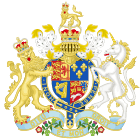Papists Act 1778 facts for kids
| Act of Parliament | |

|
|
| Long title | An Act for relieving His Majesty's subjects professing the popish religion from certain penalties and disabilities imposed on them by an Act made in the eleventh and twelfth years of the reign of King William the Third, intituled "An Act for the further preventing the growth of popery." |
|---|---|
| Citation | 18 Geo. 3. c. 60 |
| Introduced by | Lord North (Lords) |
Quick facts for kids Dates |
|
| Royal assent | 1778 |
| Commencement | 1778 |
| Repealed | 13 July 1871 |
| Other legislation | |
| Repealed by | Promissory Oaths Act 1871 |
|
Status: Repealed
|
|
The Papists Act 1778 was an important law passed by the Parliament of Great Britain in 1778. It was the first step towards giving more rights to Roman Catholics in Britain. Later that same year, a similar law was also passed in Ireland.
Before this Act, many strict laws, known as "Penal laws," were in place. These laws made it very difficult for Roman Catholics to participate in public life. They faced many restrictions in areas like owning land or holding certain jobs.
The timing of this Act was important for a few reasons. One reason was that the Pope (the leader of the Catholic Church) had stopped supporting the Jacobite cause. The Jacobites were supporters of the old royal family who had been removed from the throne. Another reason was the ongoing American Revolution. British leaders worried that Catholics in Ireland might also rebel, so they hoped this new law would help keep the peace.
Contents
What the Papists Act Changed
This Act introduced a special oath that Catholics could take. By taking this oath, they promised to be loyal to the King. They also had to reject certain ideas that were wrongly linked to Catholics at the time. These ideas included beliefs that rulers who were excommunicated (kicked out of the church) could be killed. They also had to reject the idea that promises made to non-Catholics didn't have to be kept. Finally, they had to state that the Pope did not have political power in Great Britain.
New Rights for Catholics
If Catholics took this oath, they gained some important freedoms. The Act removed some of the harsh rules from an older law called the Popery Act 1698.
- Catholics were allowed to join the army.
- They could buy and inherit land, which was a big change.
- The Act also made it harder to prosecute Catholic priests.
- The severe punishment of lifelong imprisonment for running a Catholic school was removed.
- Also, if a Catholic family member changed their religion to the official state church, they could no longer take over the property of their Catholic relatives.
Public Reaction and Later Repeal
The passing of this Act caused a lot of anger among some people. This anger led to the Gordon Riots in 1780. These were large protests and unrest, especially directed at people like Lord Mansfield, who had supported the new law.
The Papists Act 1778 remained a law for many years. It was eventually replaced by a new law, the Promissory Oaths Act 1871, in 1871.
See also
- Catholic Emancipation
- Roman Catholic Relief Act 1791
- Roman Catholic Relief Act 1829

